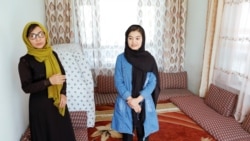An Afghan woman received the highest score last week out of 170,000 students on the national university entrance examination.
Her path has not been easy. Two years ago, an Islamic State militant suicide bombing in west Kabul killed many classmates at a school she was attending. At the time, they were preparing for exams.
She had changed her plans at the last minute to attend another event.
She talked with Thomson Reuters Foundation in a coffee shop in Kabul. "I was lucky," she said quietly, her hands around a glass of warm green tea. She spoke of wanting to work towards a brighter future for her troubled country. She thinks medicine is one of the ways she can help. She also wants to work to help the women of Afghanistan. Alizada now plans to study at the University of Kabul.
She hopes to become a brain surgeon but is also considering a diplomatic career. She told VOA’s Afghan service, “I want to bring change and serve my country. I will try and my goal is to prepare myself to be able to even become the president.”
Alizada's success comes at an important time for the country. The government this month began power-sharing talks with the Taliban Islamist militant group. The Taliban ruled the country until 2001. Until that time, the Taliban sheltered the al Qaeda terror group responsible for the September 11 attacks against the United States. As a result, the United States and its allies invaded Afghanistan in 2001.
Afghan women's rights have improved in many areas of daily life since those days. The Taliban did not let women go to work and girls could not attend school. Now, many fear losing their hard-won gains.
The Taliban say they have changed and will let girls go to school. Yet, fears remain that women's rights will not continue if the group regains influence.
The United Nations reports that about 2.2 million girls are still out of school. Less than 30 percent of women in Afghanistan can read and write.
Alizada said her success in part comes from how her parents treated her. She was equal to her two brothers - something she said was rare in Afghanistan.
'Opportunities to rise'
Like others born after the US-led invasion, Alizada grew up with different opportunities from those her own family had.
"My mother was in Kabul during the war and escaped to Ghazni," Alizada explained. Her family's native province, Ghazni, is south of the capital.
She went to the university campus to take the exams. She said she was nervous but excited.
"I wanted to do well. My parents had always supported me to study hard and I had waited for this day for years. I didn't want to disappoint them," she said.
Alizada is now waiting for university classes to start. She said she is spending her free time taking walks with her friends in the neighborhood or reading poetry.
Her older brother is studying engineering in India. She said she hoped to also win a scholarship to study in Britain, the United States or Canada.
She is not thinking only of herself. Ten years from now, she hopes to be practicing medicine. She also wants to see other women having similar success.
"I'm hoping that women across Afghanistan, in both big cities and small villages, will have opportunities to rise and to change the future of this country," she said.
"I want to help make this happen."
I’m Greg Stachel.
And I’m Jill Robbins.
This story was adapted by Greg Stachel and Jill Robbins from a report by Stefanie Glinski for Thomson Reuters Foundation. Mario Ritter, Jr. was the editor.
____________________________________________________________
Words in This Story
disappoint –v. to make someone unhappy by not doing what is expected
scholarship –n. an amount of money given to a school by a group to pay for a student’s education
What is the situation for women in your country? We want to hear from you. Write to us in the Comments Section.












